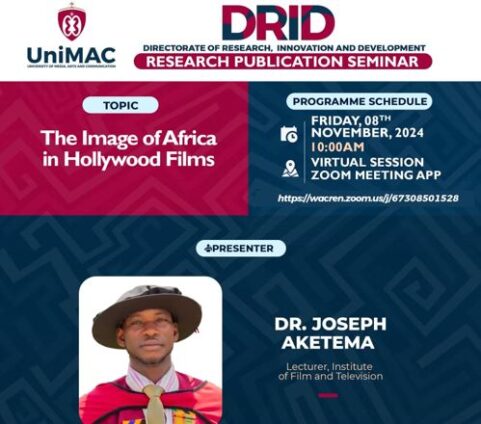The University of Media, Arts, and Communication (UniMAC) held an online seminar on November 7, 2024, organised by its Directorate of Research, Innovation, and Development (DRID).
Titled “The Image of Africa in Hollywood Films,” the session was led by Dr Joseph Aketema, a lecturer at UniMAC-IFT.
Dr Aketema’s presentation attracted an array of guests including including the Pro Vice-Chancellor of UniMAC, Prof Winston Kwame Abroampa and Nana Adwoa Awindor, a celebrated television host, African cultural ambassador and the Development Queenmother of Afigya-Kwabre district in the Ashanti Region.
In his opening remarks, Dr Aketema set the stage by discussing the powerful, often politicised and stereotypical role that media plays in shaping public perception, noting, “When the cine-camera was made in 1895, as early as 1896, Americans were using the media to capture some of the happenings in the Spanish-American world.”
He explained how Hollywood, as a political and ideological institution throughout history, portrayed Africa through its distorted lens that frequently reinforces negative stereotypes. According to Dr Aketema, such portrayals stem from early Euro-American cinema’s tendency to depict Africa as exotic, uncivilised, and thus, a burden to the Whiteman.
The seminar delved into the legacy of pioneering African filmmakers who have challenged such stereotypes, “So we talk about Paulin Soumanou Vieyra, Safi Faye, Ousmane Sembène, Fanta Régina Nacro, Idrissa Ouedraogo, Souleymane Cissé, I'll come to Ghana and talk about Kwaw Ansah, King Ampaw, and the rest, these are colonial and post-colonial African filmmakers who are not just producing films for us, but striving to represent Africa’s social reality, and as it were, give an authentic image of Africa” he said.
He highlighted the influence of Afrocentric Theory, urging African filmmakers to create pedagogical content rooted in African-centered worldviews rather than those imposed by Euro-American, and colonial legacies.
The seminar also covered pivotal historical examples, such as Zulu Heart (1908), Birth of a Nation (1915) and Walter Futter’s Africa Speaks (1929), which Dr. Aketema cited as evidence of early 20th-century media's racially biased portrayals of Africans and people of African descent. Additionally, he touched on the more recent film Hotel Rwanda (2004), critiquing how its portrayal of protagonist Paul Rusesabagina significantly diverged from witness accounts and historical records, casting doubt on the accuracy of Hollywood's rendition of African stories.
A dynamic Q&A session followed the lecture, where participants discussed issues such as African films having traditional settings and Africans building their own distribution platforms such as Netflix.
The Pro Vice-Chancellor of UniMAC, Prof. Winston Kwame Abroampa commended Dr Aketema’s presentation and shared the insight he picked from the presentation “Something I picked from the presenters' submission, is having to do with the fact that we always get people presenting African stories in their own way, telling the African story, or looking at African realities with Eurocentric lenses, or telling our stories from their own perspectives and so on. And it's high time we begin to tell our stories ourselves” he said. “So, I think it's a good thing, and I will have an opportunity to be part of more of these presentations so that together we can contribute to academia, and also to the development of Africa as a whole” he added expressing his delight in the seminar.
Dr Aketema concluded by encouraging African filmmakers to, "examine communication products from an African and anti-imperial point of view," he suggested that African cinemas should endeavour to adopt methodologies that authentically portray African experiences and counteract the misrepresentations frequently seen in international media.
Latest Stories
-
AFCON 2025Q: Cameroon complete unbeaten qualifying run, Kenya and Namibia bow out
45 seconds -
AFCON 2025Q: Tanzania defeats Guinea to secure AFCON ticket
11 mins -
Ghana embarks on polio vaccination campaign amid rising cholera cases
25 mins -
Election 2024: NCCE urges political parties to foster peaceful campaigns
29 mins -
We have disappointed the country – Black Stars team manager, Ameenu Shardow
33 mins -
‘I never thought of playing for Germany even though I was born there’ – Otto Addo
40 mins -
Samira Bawumia launches second literature anthology, ‘We Move: Ghanaian Dream in Motion’
41 mins -
Jobberman CEO charges employers to create culture of excellence in today’s competitive market
50 mins -
A vote for Bawumia an endorsement of hardship and corruption – Mahama
58 mins -
Access Bank launches ‘Power of 100 Africa’ to celebrate trailblazing women across continent
1 hour -
Monuments of Leadership: Honouring Ghana’s presidents and the debate on legacy
1 hour -
Fortitude Child Support Foundation, Shai Osudoku District Hospital create prematurity birth awareness in 2-day campaign
1 hour -
NDC calls for immediate removal of Brigadier Gen. Opoku
1 hour -
CIMG holds 34th AGM
1 hour -
Healthcare Education: Adapt to AI to improve educational outcomes; patient-centered care
1 hour

